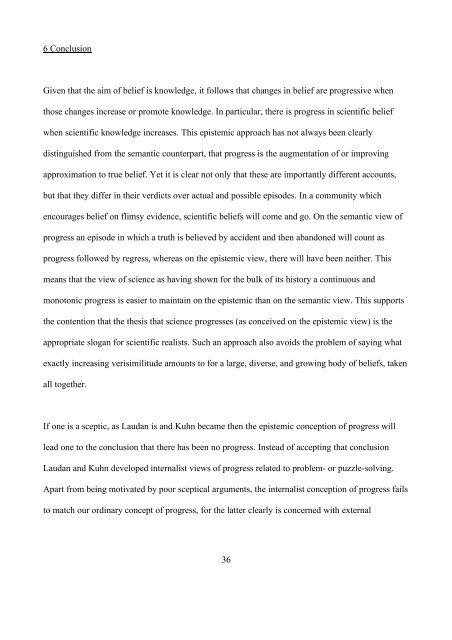What is Scientific Progress?
What is Scientific Progress?
What is Scientific Progress?
You also want an ePaper? Increase the reach of your titles
YUMPU automatically turns print PDFs into web optimized ePapers that Google loves.
6 Conclusion<br />
Given that the aim of belief <strong>is</strong> knowledge, it follows that changes in belief are progressive when<br />
those changes increase or promote knowledge. In particular, there <strong>is</strong> progress in scientific belief<br />
when scientific knowledge increases. Th<strong>is</strong> ep<strong>is</strong>temic approach has not always been clearly<br />
d<strong>is</strong>tingu<strong>is</strong>hed from the semantic counterpart, that progress <strong>is</strong> the augmentation of or improving<br />
approximation to true belief. Yet it <strong>is</strong> clear not only that these are importantly different accounts,<br />
but that they differ in their verdicts over actual and possible ep<strong>is</strong>odes. In a community which<br />
encourages belief on flimsy evidence, scientific beliefs will come and go. On the semantic view of<br />
progress an ep<strong>is</strong>ode in which a truth <strong>is</strong> believed by accident and then abandoned will count as<br />
progress followed by regress, whereas on the ep<strong>is</strong>temic view, there will have been neither. Th<strong>is</strong><br />
means that the view of science as having shown for the bulk of its h<strong>is</strong>tory a continuous and<br />
monotonic progress <strong>is</strong> easier to maintain on the ep<strong>is</strong>temic than on the semantic view. Th<strong>is</strong> supports<br />
the contention that the thes<strong>is</strong> that science progresses (as conceived on the ep<strong>is</strong>temic view) <strong>is</strong> the<br />
appropriate slogan for scientific real<strong>is</strong>ts. Such an approach also avoids the problem of saying what<br />
exactly increasing ver<strong>is</strong>imilitude amounts to for a large, diverse, and growing body of beliefs, taken<br />
all together.<br />
If one <strong>is</strong> a sceptic, as Laudan <strong>is</strong> and Kuhn became then the ep<strong>is</strong>temic conception of progress will<br />
lead one to the conclusion that there has been no progress. Instead of accepting that conclusion<br />
Laudan and Kuhn developed internal<strong>is</strong>t views of progress related to problem- or puzzle-solving.<br />
Apart from being motivated by poor sceptical arguments, the internal<strong>is</strong>t conception of progress fails<br />
to match our ordinary concept of progress, for the latter clearly <strong>is</strong> concerned with external<br />
36






